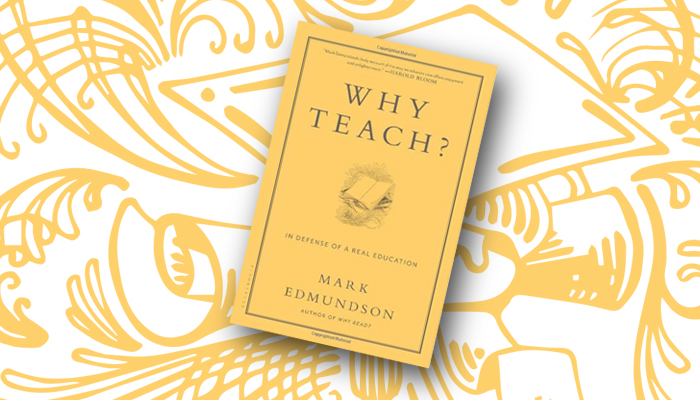
Brush Up Your Shakespeare
A professor decries today’s emphasis on employment training at the expense of intellectual discovery.
Why Teach? In Defense of a Real Education
By Amanda Ripley
Simon & Schuster 2013, 306 pages
What advice can engineering educators glean from a humanities professor with a clear bias for his own field? At one point in this collection of essays, Mark Edmundson declares that students who don’t major in English are making a mistake – a message he would like to “yell over the transoms of my colleagues’ offices in economics and business and all other purportedly success-ensuring disciplines.” Throughout this book, he champions Wordsworth, Homer, Milton, and Plato, while advising that “when people talk about innovation and ‘partnering’ with big-money institutions,” students would be wise to run the other way.
Despite a lively and seemingly contentious delivery, Edmundson, a prolific University of Virginia professor of English, is not hell-bent against the sciences. Rather, he delivers a fierce plea for the pursuit of “real education” – by which he means deep learning, inquiry, and passion. English courses help students ponder and find their place among big ideas, he argues, and people who grapple with such overarching concepts are those who “want to be teachers and scientists and soldiers and doctors and legal advocates for the poor.” In Why Teach? the author wants educators, students, and administrators alike to consider what a humanities education should be and how it could benefit everyone.
Much of higher education today focuses on the wrong concerns, Edmundson believes. The “corporate university” touts productivity and incentivizing without questioning the goal. Extending the competitive rat race of high school, college students gun for top grades, double- or even triple-major, cut corners like mad, and rush to check off their next accomplishment. The new ethos, Edmundson contends, is to “skate fast over the surfaces of life and cover all the extended space you can.” Yet along their journey, young people fail to develop a sense of involvement and responsibility, though these are precisely the years when they should be cultivating the values that define them – glimmerings of the people they hope to become in their future lives and professions.
While university admissions offices are busy churning out glossy brochures to promote their campuses, many instructors are so focused on advancing their careers they leave their students behind. As evidence, Edmundson points out that almost no undergraduates can read and understand their professors’ scholarly publications. In the meantime, courses have become pablum, relying on movies and tech gimmicks to feed students’ desire for amusement – and score positive course evaluations. But where in all this is intellectual growth? “Education needs to be about more than training and entertaining, about learning how to do a lucrative job and how to disperse the money that job creates,” the author declares. And if academics are to inspire their students to serious thought and discussion, where better to do so than in the English classroom? Young people are “on the verge of choosing careers, of marrying, of entering the public world,” Edmundson reminds us. “They are in dire need of maps – or of challenges to their existing sense of the terrain.” Forget Marxist or Freudian readings of texts, he tells his English colleagues: Have students immerse themselves in Hamlet and The Iliad to discover what truths these texts might contain for their own lives.
Edmundson certainly is not the first to decry the dumbing down of higher education or to advocate better educational goals. At times, his repeated outcry over shallow teaching and learning, mindless use of Facebook, and lack of engagement becomes wearisome. This is particularly true in his bitter extended riffs of the “self-abnegating, ever agreeable” contemporary professor, who must support “pleasure and high-powered training” or seek other employment. Yet his more heartfelt essays are strongly persuasive about the resounding value of the liberal arts. Engineering educators concerned about their own students’ underdeveloped sense of ethics and responsibility would do well to pick up this book – and to urge signing up for that upcoming seminar on the Romantic poets.
Reviewed by Robin Tatu
Robin Tatu is Prism’s senior editorial consultant.